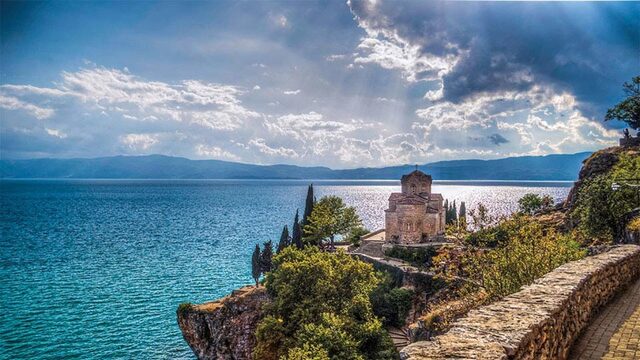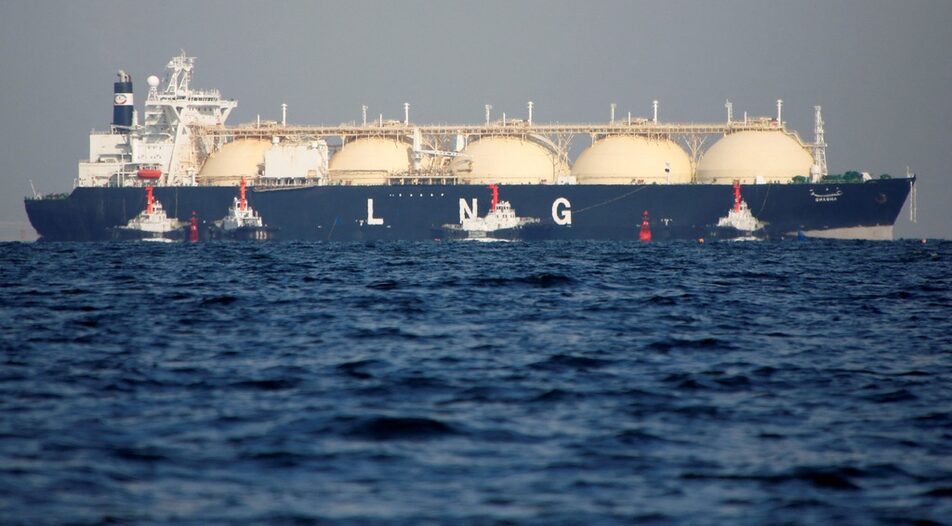It made for a very strange sight. Kiril Petkov's first visit to the US got off to an inauspicious start - the initial two days resembled a badly planned school trip. Petkov shook hands with 2nd and 3rd level officials, speaking about "high praise in the fight against corruption". It was a difficult situation for a PM with a whole range of troubles back home and whose maiden visit to a top ally didn't even seem to include meeting a minister.
Yet the real kicker came in the end. After meeting secretary Blinken and vice president Kamala Harris, Petkov announced that Bulgaria had negotiated LNG deliveries from the US. There wasn't much detail in that momentous announcement, but here is what we know.
There will be 2 ships for now which will deliver around 200 mln. cubic meters of gas in June. The price will be significantly lower than that of Gazprom which stopped Russian deliveries last month. The deal is negotiated between Bulgargaz and American producers on Henry Hub prices. Those are currently around 21-22 euro per ton. The final price, including shipment and regasification, will be roughly around 60-70 euros, which is still a lot lower than the European price - around 95 euros per ton, and the Russian one - about 80 euros.
There is, of course, a reason for the American suppliers doing business with a rather small market (3 bn.c.m per year) on the other side of the Atlantic on the patchy basis of just several ships.
That reason is called geopolitics.
Kiril Petkov and his mate Assen Vassilev have executed a massive policy U-turn, effectively cutting all ties with Russia. This is like a huge ship changing direction: it is slow, screeching and shaky, yet you can see it happen if you look long enough. Bulgaria has tried in the past 20 years, throughout various governments, to play a middle role - appeasing the US and the EU, but maintaining relations with Moscow, mainly through political corruption and big energy deals. Generations of politicians grew up on that feeding tube. The war in Ukraine gave the new government a chance to stop this and the halting of Russian gas gave them the pretext they waited for.
The only thing they needed was a partner to help them keep the ship floating. The US, it seems, is willing to play that part. I don't doubt that this deal received a nod from the White house. Petkov's visit was needed to seal it.
There are huge questions, however.
First of all, will there be enough gas? Two ships will cover the next month or so, but then we need a lot more for the next year - and for longer. Azeri gas is part of the solution but the mix needs to be broader and safer and sustainable, not to mention affordable.
Second, where will it come through? Greek connections are full, Turkey has some, but we don't have a deal with them. The clock is ticking.
And third, make no mistake. There are HUGE vested interests against this. Russia has spent lots of money on building a political and business network here. Losing Bulgaria will be tantamount to a defeat for Putin and he does not like those. The moment is prime for muddying the waters - this government is already reeling from various crises.
The last PM who changed Bulgaria's track - Ivan Kostov in the end of the 90's, managed to lay the groundwork for NATO and EU entry. Some people still believe Russia punished him in the next elections by bringing back the tsar (an altogether colorful story, for those of you who don't remember it). So Petkov should not fool himself that he will have it any easier.
This newsletter was created with the help of
Martin Dimitrov
1. Politics this week:
To begin with: next week there will be protests. Lots of them. Transport companies are going on strike because of fuel and road prices, employers' associations are going to protest for more energy subsidies; even Sofia's city transport will be demanding more money from the government.It's perhaps no surprise that many people are unhappy in the current high-inflation-high-insecurity situation. Yet there's more here than meets the eye.
First of all, it's a bit unsettling that the transport companies and the employers' organizations didn't feel the need to protest at all in the past and now suddenly decided to go out on the same day.
Some of the ideas behind the protest are ludicrous: for example, transportation firms are whining about needing to pay taxes on 2-grade roads, when all citizens with their cars are already paying for those. Or employers, whose duty after all, is to pay salaries, are demanding that "the nation stops getting poorer". Both want the government to curb inflation (I also would like this, if it were possible).
All of those structures are in a way connected or obliged to the former ruling party of GERB. They all have their grievances, yet they either expect them to be dealt with the way Boyko Borissov did (giving them money or procurement), or are just working in favor of Borissov. Or both.
Let's take Sofia's transport for example. Their main demand is that the government should pay more money to the municipality, in order to keep buses and trams going. We are, the mayor says, paying what we can, but we ran out of money and also - of gas (some of the lines are powered by natural gas). Yet this week it transpired that the municipal company buys its gas not from the state-owned Bulgargaz, but from a middleman, who charges a commission and keeps the prices higher.
To make matters even juicier, the middleman is an ex-Soviet general. I kid you not.
(Don't) know thy history
The ESTAT agency survey, published on Wednesday, showed that a significant portion of Bulgarians are totally ignorant of key elements of Bulgarian-Russian historical relations and are tunnel-visioned when it comes to analyzing current relations.
While 59 percent claim they know "very well" the interactions between the two countries in the past 150 years, 61 percent of respondents did not know that Russia opposed the unification of Bulgaria in 1885, only 21 percent knew that Russia declared war on Bulgaria in 1915, and 42 percent were certain that Moscow would never do that to its brotherly nation!
Of course, the majority of respondents got their education from school books published before 1989 (59 percent) under the influence of the Big Soviet Brother. This should remind us about the genius of George Orwell when he wrote that "who controls the past controls the future".
Also, if you missed who is readying to jump on the Russophile bandwagon, check out our article from Thursday on the pro-Russian parties exploiting the fears of the disillusioned. We also published the second part of the analysis of the sources of Russian influence in the country on Tuesday - see it here.
2. Economy
We might deal without Russian gas, but the oil is a bit trickierBulgaria, alongside Hungary, Slovakia and the Czech Republic, requested a two-year transition period from the EU before fully banning imports of Russian oil. While the EU as a whole imports about 30 percent of its oil from Russia, these four countries have much more to lose (Bulgaria is over 90 percent dependent on Russian oil).
This was, in short, the position expressed by Bulgarian Finance Minister Assen Vassilev in an interview for National Television on Sunday last week. The EC, however, flatly disbanded that request.
Figures:
50 liters of gasoline per monthWill be sold at a discount to every citizen. That is part of the anti-inflationary measures the ruling coalition is discussing. The others include 9% VAT for heating and natural gas.
19%
Growth registered the industrial production in the country in March vis-a-vis last year.
2.5%
Will be Bulgarian GDP growth this year, said the EBRD.
5.7%
Is the growth rate of bankruptcies in 2021 compared to 2020 in Bulgaria, according to Coface.
3. Business
IPS
Bulgarian internet provider got 10.6 mln.euros in an investment round from Bulgarian angel investors. The company works on the Indian market and you can read about it here.
4. Energy
Look out for the report!K Insights will produce the second report of the year, this time on the country's energy sector: the trends, the deals, the opportunities and the players. Make sure to not miss it - it will be free of charge for our subscribers and you can buy it separately, if you are not.
5. Watch out for:
People
Gabriela Naplatanova - the TV journalist and producer is President Rumen Radev's new appointee to media regulator SEM. The regulator will decide on the next head of the National TV BNT.
Ilian Philipov - the owner of the largest transport and building company PIMK, this week took his trucks out on the streets to join 2 protests simultaneously - one in Plovdiv against decisions by the local authorities and one in Sofia against toll taxes. Philipov won at least one of the fights and flexed his muscles for the first time. Expect more on this front.
Date
1 June - is the last day on which it is certain that the capital (highly dependent on gas deliveries) will have hot water, according to members of the Sofia City Council. Better get a water heater.
Place
Ohrid

The N.Macedonian city on the lake is proving to become a new hotspot in relations between Bulgaria and its neighbor. After almost seven decades of isolation, the Macedonian Orthodox Church is no longer in schism with the rest of the Orthodox World, the Ecumenical Patriarchate of Constantinople has decided. Although not independent from the Serbian church, which is still not letting it go, this decision puts the church back on the map. It is a bit difficult for the Bulgarian church to swallow, because the name under which the church is called is Ohrid Archbishopric. Bulgarian Patriarchate says this name belongs to them, as this was the name the Bulgarian church has been known under since the X century.
It made for a very strange sight. Kiril Petkov's first visit to the US got off to an inauspicious start - the initial two days resembled a badly planned school trip. Petkov shook hands with 2nd and 3rd level officials, speaking about "high praise in the fight against corruption". It was a difficult situation for a PM with a whole range of troubles back home and whose maiden visit to a top ally didn't even seem to include meeting a minister.
Yet the real kicker came in the end. After meeting secretary Blinken and vice president Kamala Harris, Petkov announced that Bulgaria had negotiated LNG deliveries from the US. There wasn't much detail in that momentous announcement, but here is what we know.












